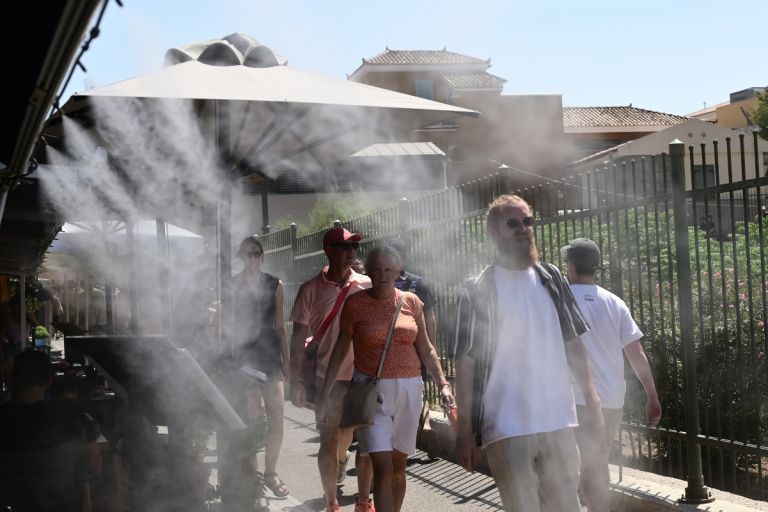Greece in the “Red” Zone – Heatwave with Temperatures Reaching 43°C! When the Heatwave is Expected to End

Πηγή Φωτογραφίας: Eurokinissi (Αρχείου)//Greece in the “Red” Zone – Heatwave with Temperatures Reaching 43°C! When the Heatwave is Expected to End
Very high temperatures will persist across Greece in the coming days, with the highest readings expected on Thursday, July 24, and Friday, July 25, according to the updated Emergency Weather Bulletin. The heatwave is likely to end nationwide by Sunday, July 27.
Weather: Where 43°C Is Expected
A. Minimum temperatures will remain high (around 27 to 29 degrees Celsius), especially in urban areas.
B. Starting Friday (July 25), strong northern winds of force 6 Beaufort will gradually prevail in the eastern regions and especially in the Aegean Sea, intensifying on Saturday (July 26).
Detailed Forecast Through Friday (July 25):
- Tuesday (July 22) and Wednesday (July 23) maximum temperatures will reach:
- a) In mainland Greece, 39 to 41°C, with localized peaks of 42°C in Central Macedonia, Eastern Sterea, and Eastern Peloponnese, and 43°C in Thessaly. Athens and Thessaloniki will see 39 to 40°C.
- b) In the islands of the Eastern Aegean and the Dodecanese, 37 to 39°C, locally reaching 40 to 41°C on Wednesday.
- c) In the Ionian Islands and Crete, 37 to 38°C on Wednesday.
- Thursday (July 24) maximum temperatures will reach:
- a) Mainland Greece: 39 to 41°C, locally 42 to 43°C in the east. Athens 41 to 42°C, Thessaloniki 40°C.
- b) Eastern Aegean and Dodecanese islands: 38 to 40°C.
- c) Ionian Islands and Crete: 37 to 39°C.
- Friday (July 25) maximum temperatures will reach:
- a) Mainland Greece: 40 to 41°C, locally 42°C, and in the west up to 43°C. Athens 41 to 42°C, Thessaloniki 39°C.
- b) Eastern Aegean and Dodecanese islands: 38 to 40°C.
- c) Ionian Islands: 38 to 40°C.
- d) Southern Crete: 39°C.
Who is Most at Risk from the Heatwave
- Elderly people
- Infants and young children
- Pregnant and breastfeeding women
- Overweight or obese individuals
- People working or exercising intensely in hot environments
- Individuals with chronic illnesses (cardiovascular diseases, hypertension, diabetes, lung diseases, blood disorders, kidney or liver diseases, mental illnesses, dementia, alcoholism, or drug abuse)
- People with acute illness, such as fever or gastrointestinal infections
- Those on certain medications (diuretics, anticholinergics, psychiatric drugs, hormonal treatments including insulin and diabetes medications) — they should consult their doctors regarding possible dosage adjustments during extreme heat
Heat-Related Conditions: Symptoms and First Aid
When ambient temperatures exceed what the human body can tolerate, combined with other factors like humidity and lack of wind, serious heat-related illnesses can develop, potentially leading to severe illness or death.
Initial symptoms may include:
- Severe headache
- Weakness and fatigue
- Fainting tendencies
- Low blood pressure
- Nausea and vomiting
- Rapid heartbeat
Heatstroke symptoms involve:
- Sudden body temperature rise (>40.5°C)
- Red, hot, dry skin (sweating stops)
- Dry, swollen tongue
- Rapid heartbeat and breathing
- Intense thirst
- Headache, nausea, vomiting
- Dizziness, confusion, disorientation
- Aggressive or unusual behavior, seizures, loss of consciousness, or coma
Treatment should ideally be given in hospitals. Until then, immediate first aid includes:
- Moving the person to a cool, shaded, preferably air-conditioned place
- Removing clothing and applying ice packs or cold compresses on neck, armpits, and groin
- Cold water immersion, shower, or spray
- Giving small sips of cool water or diluted fruit juice if able to swallow
General Precautions
- Stay in air-conditioned environments
- Wear light, loose, breathable, and light-colored clothing
- Use hats that allow ventilation
- Wear sunglasses with UV protection
- Avoid sun exposure, especially for infants and the elderly
- Avoid heavy physical work and long trips without air conditioning
- Public transport should ensure air conditioning is functioning properly
- Take frequent cool showers and apply cold compresses on the head and neck
- Eat small, light meals rich in fruits and vegetables
- Drink plenty of fluids and avoid alcohol; increase salt intake if sweating heavily
- People with chronic diseases should consult their doctors
- Elderly should not be left alone and must have daily care support
- Workplaces should provide air conditioning or fans and ensure good ventilation, especially in facilities caring for vulnerable populations
Emergency Measures Announced
The Ministry of Labor has announced extraordinary measures to protect workers from heat stress during the heatwave. Outdoor work is prohibited from 12:00 to 17:00, with remote work offered to high-risk groups.
The outdoor work ban currently applies to the regions of Attica, Central Macedonia, Thessaly, and specific areas including Orestiada, Boeotia, Fthiotida, Chalkida, Aetolia-Acarnania, Central Laconia, and lowlands of Peloponnese. It also extends to island regions such as Chania, Rethymno, Ionian Islands, Kythira, Lesbos, Chios, and Rhodes.
The decision to ban outdoor work is based not only on temperature but also on humidity and wind levels.
Government Advisories
The General Secretariat for Civil Protection has alerted all relevant agencies, regions, and municipalities to remain on high alert to promptly respond to the effects of the extreme heat.
Source: pagenews.gr
Διαβάστε όλες τις τελευταίες Ειδήσεις από την Ελλάδα και τον Κόσμο






Το σχόλιο σας